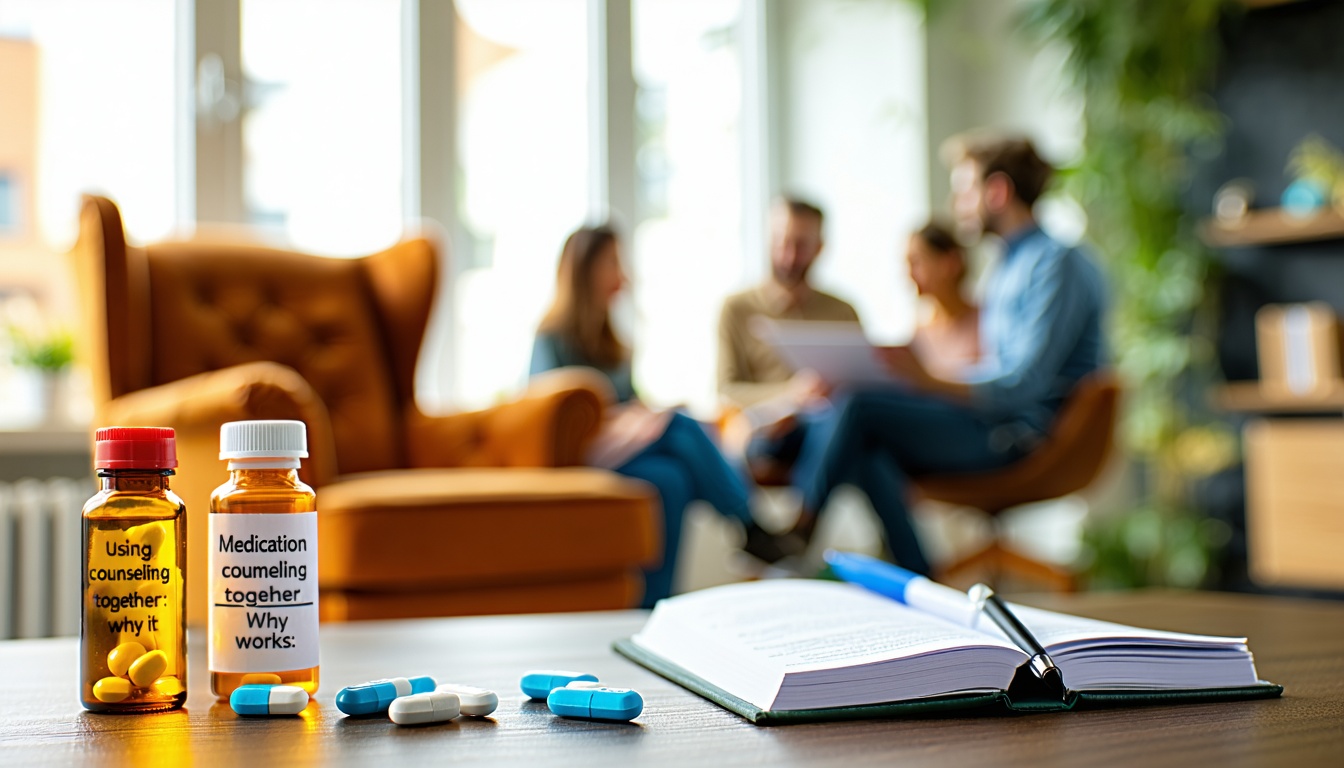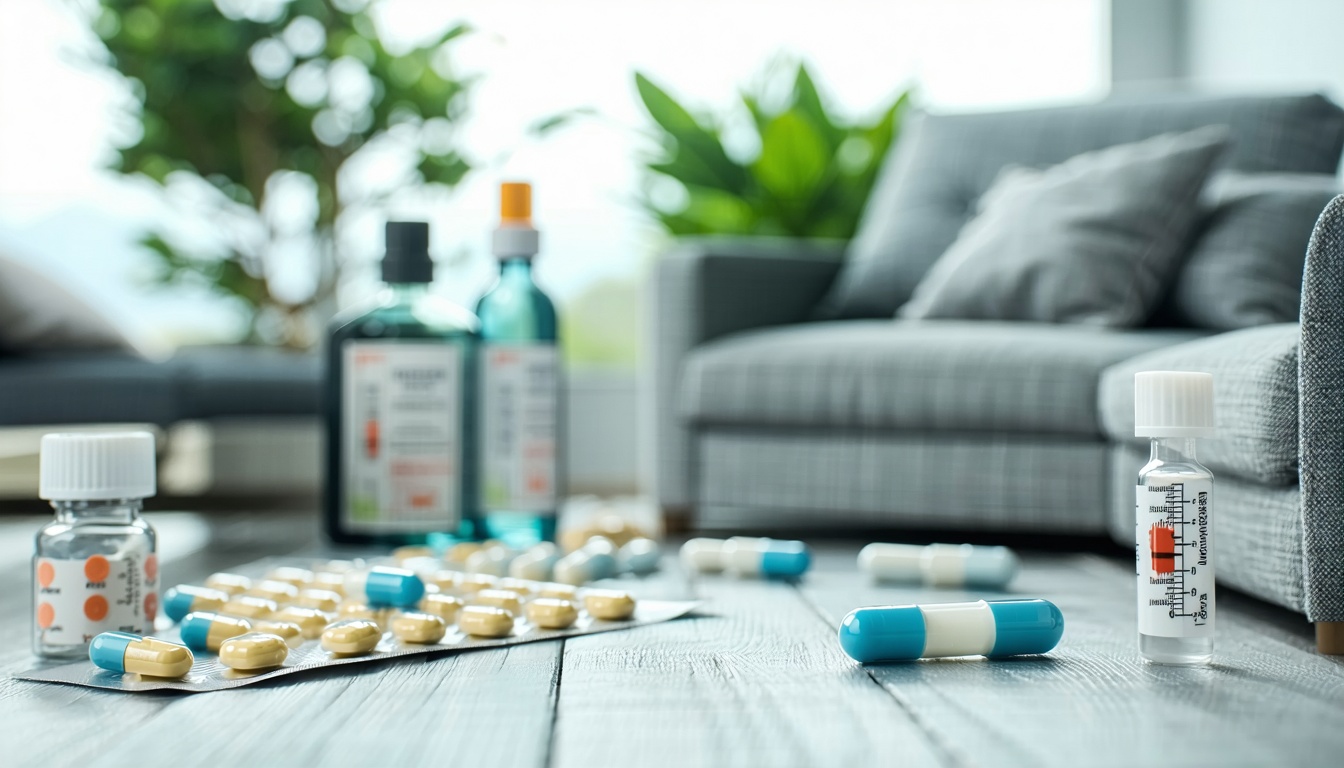Addiction Treatment Centers of MD: Your Path to Recovery
At Addiction Treatment Centers of MD, we’re all about helping you kick addiction to the curb. Our services cover everything from one-on-one therapy to intensive group sessions and medication-assisted treatment. Let’s break down what makes our approach work and how we’re here to support you for the long haul.
What Keeps People in Outpatient Treatment?
Sticking with outpatient treatment is key to beating addiction. Studies show that folks who stay in treatment are often White, male, and have jobs. On the flip side, those who drop out tend to face more challenges like being marginalized, lacking job skills, having recent hospital stays, or a family history of substance abuse (NCBI Bookshelf).
| Client Characteristics | Retention Likelihood |
|---|---|
| White, Male, Employed | Higher |
| Marginalized, Lack of Skills, Recent Hospitalization, Family History of Substance Abuse | Lower |
Knowing this, we tweak our programs to fit each person’s needs better, boosting the chances they’ll stick around and succeed. Want to know more? Check out our addiction treatment in Maryland page.
How the Substance Abused Affects Retention
The type of substance someone’s hooked on can also impact how long they stay in treatment. For instance, people who abuse alcohol are more likely to stick with treatment compared to those using cocaine (NCBI Bookshelf). But, this isn’t always a sure thing.
| Substance Abused | Retention Likelihood |
|---|---|
| Alcohol | Higher |
| Cocaine | Lower |
We use this info to craft strategies that help everyone, no matter what they’re dealing with, to stay on track and get the support they need.
Why Relapse Prevention Matters
Stopping a relapse before it starts is a big deal. Most slips happen in the first few months of treatment, so we focus on relapse prevention strategies to keep minor setbacks from turning into full-blown relapses (NCBI Bookshelf).
Research shows that if you stay clean for 2 years, there’s a good chance you’ll stay that way for 10 years (NCBI Bookshelf). Plus, sticking with treatment for at least 3 months ups your odds of success (NCBI Bookshelf).
| Treatment Duration | Success Likelihood |
|---|---|
| 3 Months or More | Higher |
| Less Than 3 Months | Lower |
We focus on relapse prevention with personalized counseling, support groups like Mara Groups, and other proven methods to help you stay sober for good. For more info, check out our section on evidence-based addiction treatment.
So, if you’re ready to take the first step towards recovery, we’re here to walk with you every step of the way.
Individual Therapy for Addiction
At Addiction Treatment Centers of MD, we get it—addiction can turn your life upside down. That’s why individual therapy is a big deal for us. It’s all about giving you the one-on-one care you need to get back on track.
What We Aim For
Individual therapy for addiction isn’t just about quitting drugs or alcohol. It’s about fixing the whole picture. We want to help you stop using, tackle life’s messes, feel better physically and mentally, mend relationships, and be ready if you ever feel tempted again. Our therapists work with you to create a plan that hits all these marks.
| Goal | What It Means |
|---|---|
| Stay Clean | Stop using and avoid slipping up. |
| Solve Life Problems | Deal with personal, social, and work issues. |
| Feel Better | Boost your physical and mental health. |
| Fix Relationships | Heal and strengthen your bonds with others. |
| Be Ready | Learn how to handle triggers and avoid relapse. |
Sticking With It
Staying clean for the long haul is our main goal. Studies show that if you can stay off drugs or alcohol for two years, there’s a good chance you’ll still be clean after ten years. This proves that sticking with treatment works. We push for at least three months of treatment because it really ups your chances of success.
Joining aftercare or support groups for addiction after your main treatment can also help a lot. We always recommend staying involved in these programs to keep you on the right path.
Your Therapist’s Role
Your therapist is like your guide through this journey. They’re trained pros who create a safe space for you to talk about what’s going on in your head. They use different techniques like behavioral therapies, cognitive behavioral therapy (CBT), social skills training, and relapse prevention strategies to help you gain control, cut down on substance use, and avoid relapse.
| Technique | What It Does |
|---|---|
| Behavioral Therapies | Help you change your behavior and gain self-control. |
| Cognitive Behavioral Therapy (CBT) | Tackle negative thoughts and actions. |
| Social Skills Training | Improve how you interact with others. |
| Relapse Prevention | Teach you how to handle triggers and avoid slipping up. |
Therapists also help you deal with the ups and downs of recovery. They offer guidance, support, and keep you accountable. By building a strong bond with you, they empower you to take charge of your recovery and reach your goals.
Want to know more about our approach to addiction treatment? Check out our intensive outpatient group therapy, medication-assisted treatment, and trauma-informed addiction treatment. Find the right path to recovery for you or your loved one.
Effective Strategies in Individual Therapy
At Addiction Treatment Centers of MD, we use a mix of practical strategies in one-on-one therapy to tackle addiction. Our goal? Help folks regain control, cut down on substance use, and dodge relapses.
Behavioral Therapies
Behavioral therapies are a big part of our game plan. They focus on boosting self-control, cutting down on drinking, and keeping relapses at bay. Here’s what we offer:
- Social Skills Training: Teaches folks how to interact positively without turning to substances.
- Cue Exposure Treatment: Exposes individuals to substance-related triggers without actual use to curb cravings.
Cognitive Behavioral Therapy (CBT)
Cognitive Behavioral Therapy (CBT) is a top-notch method for tackling drug and alcohol issues. It’s structured, time-limited, and zeroes in on spotting and changing irrational thoughts, managing bad moods, and preventing relapses. Here’s the lowdown:
- Identifying Triggers: Helps folks spot situations or emotions that lead to substance use.
- Cognitive Restructuring: Tweaks irrational thoughts that push people toward substance use.
- Developing Coping Skills: Teaches strategies to handle cravings and steer clear of risky situations.
| Substance | Efficacy of CBT |
|---|---|
| Alcohol | High |
| Cannabis | High |
| Amphetamines | High |
| Cocaine | High |
| Heroin | High |
Relapse Prevention Techniques
Relapse Prevention (RP) is crucial in individual therapy for addiction. RP strategies help folks keep their progress and avoid slipping back. Here’s what we focus on:
- Identifying High-Risk Situations: Spotting situations that might lead to relapse.
- Developing Coping Skills: Crafting strategies to handle stress and cravings.
- Managing Lapses: Learning how to bounce back quickly from a slip without going back to full-blown use.
- Achieving a Balanced Lifestyle: Encouraging a healthy, balanced lifestyle to support long-term recovery.
For more on RP strategies, check out our article on relapse prevention strategies.
These strategies, along with our all-encompassing approach to addiction treatment in Maryland, give folks the tools they need for long-term recovery. By blending behavioral therapies, CBT, and RP techniques, we help individuals build a solid foundation for a healthier, substance-free life.
Group Therapy in Addiction Treatment
At the Addiction Treatment Centers of MD, group therapy is a big part of how we help people beat addiction. Let’s dive into why group therapy rocks and how it can help you or a loved one on the road to recovery.
Why Group Therapy is Awesome
Group therapy gives folks in recovery a chance to pick up new coping tricks, practice talking things out, and draw strength from others who get what they’re going through. Here’s why group therapy is a game-changer:
- Different Perspectives: Everyone brings their own story and advice, so you get a bunch of different ways to tackle problems.
- Support Squad: You’re not alone. The group cheers you on and keeps you motivated.
- Skill Practice: It’s a safe space to try out new ways to handle stress and communicate better.
- Community Vibes: Being part of a group helps you feel connected and less alone.
Group Therapy vs. One-on-One Therapy
Both group and individual therapy work well for addiction, but they each have their perks. Group therapy is usually cheaper and great for issues that involve social interactions. Individual therapy, on the other hand, is better for stuff that needs a personal touch.
| Therapy Type | Key Benefits | Cost-Effectiveness | Best For |
|---|---|---|---|
| Group Therapy | Different perspectives, support, skill practice, community vibes | High | Social interaction issues |
| Individual Therapy | Personal attention, one-on-one trust | Moderate | Personal trust issues |
Want to know more about our one-on-one therapy? Check out our individual therapy for addiction page.
The Power of Group Cohesion
Group cohesion is all about how tight-knit the group feels. When the group is solid, everyone participates more, trusts each other, and offers better support. This is super important for making therapy work.
At the Addiction Treatment Centers of MD, we focus on building strong, supportive groups. We want everyone to feel like they belong and are valued. This makes the therapy more effective and helps with long-term recovery.
For more details on our group therapy sessions and other services like support groups for addiction, visit our website.
By mixing these elements, we tackle not just the addiction but also the overall well-being of the person. Whether through group therapy or individual sessions, our mission is to support everyone on their path to recovery.
Specialized Approaches in Intensive Outpatient Treatment
At Addiction Treatment Centers of MD, we get that everyone’s path to recovery is different. Our Intensive Outpatient Treatment (IOT) is all about meeting those unique needs with care that really hits home.
Tackling Severe Mental Disorders
When it comes to severe mental disorders, we’ve got a game plan. Conditions like depression, anxiety, and bipolar disorder can throw a wrench in addiction recovery. Here’s how we handle it:
- Dual Diagnosis Treatment: We tackle mental health and substance use issues at the same time.
- Medication Management: The right meds can make a world of difference.
- Therapeutic Interventions: We mix in one-on-one and family therapy to dig into the root problems.
Our aim? To build a safe space where clients can find their footing and move forward in their recovery.
Customizing Treatment for Different Behaviors
Not everyone acts the same, and that’s cool. Some folks might be disruptive, while others keep to themselves. Here’s how we adapt:
- Behavioral Therapies: Social skills training helps with getting along better with others.
- Cognitive Behavioral Therapy (CBT): This helps clients spot and change negative thoughts (cognitive-behavioral therapy maryland).
- Motivational Interviewing: We get clients pumped about making changes (NCBI Bookshelf).
These methods make sure everyone gets the personal touch they need to tackle their own hurdles.
Strategies for Different Client Profiles
We know clients come from all walks of life, each with their own story. Here’s how we cater to different backgrounds:
| Client Profile | Retention Factors | Strategies |
|---|---|---|
| Employed, White, Male | Sticks around longer | Keeps engaged with aftercare programs |
| Marginalized Status | More likely to drop out | Tackles social issues, offers job training |
| Recent Hospitalization | More likely to drop out | Combines care with medical follow-ups, supports physical health |
| Family History of Substance Abuse | More likely to drop out | Family therapy, relapse prevention strategies |
We’re all about a well-rounded approach that looks at the whole picture of a client’s life and needs.
For more info on how we can help you or someone you care about, check out our page on addiction treatment in Maryland.
Medication-Assisted Treatment for Opioid Addiction
At the Addiction Treatment Centers of MD, we know that beating opioid addiction is tough. Medication-assisted treatment (MAT) is a big part of our strategy. Let’s break down how these meds work, their role in preventing overdoses, and why counseling is a game-changer.
How OUD Medications Work
Medications like methadone and buprenorphine are lifesavers when used right. They help folks stay in treatment and cut down on illegal opioid use.
| Medication | Safety | Effectiveness |
|---|---|---|
| Methadone | High | High |
| Buprenorphine | High | High |
Want to dive deeper? Check out our methadone treatment centers page.
Cutting Down Overdose Rates
One of the best things about MAT is that it slashes overdose rates. Using methadone or buprenorphine makes you way less likely to overdose compared to going without them.
| Medication | Overdose Reduction |
|---|---|
| Methadone | 50% – 60% |
| Buprenorphine | 40% – 50% |
Curious about how we help keep you safe? Head over to our relapse prevention strategies section.
Why Counseling Matters
Counseling isn’t just a nice-to-have; it’s essential. Pairing meds with counseling leads to better results than meds alone. Techniques like motivational interviewing and cognitive-behavioral therapy (CBT) are super effective.
| Counseling Method | Effectiveness |
|---|---|
| Motivational Interviewing | High |
| Cognitive-Behavioral Therapy (CBT) | High |
We believe in a well-rounded approach, mixing meds with strong counseling services. This way, our patients get the best care tailored just for them.
For more on our counseling options, check out our pages on family therapy for addiction and support groups for addiction.
Motivational Interviewing in Addiction Therapy
Motivational Interviewing (MI) is a game-changer for folks battling addiction. At Addiction Treatment Centers of MD, we use this technique to boost treatment success and help our patients make real changes.
Getting Patients to Embrace Change
Getting patients to embrace change is at the heart of MI. We dig into what makes them tick, their worries, and their hopes. By tackling their mixed feelings and creating a supportive vibe, we help them take those first, crucial steps toward recovery. MI has shown to be super effective in cutting down risky drinking, especially in the short run, and works wonders for young people and those with low dependence (NCBI).
Cutting Down Substance Use
MI shines in cutting down substance use, especially right after the intervention. It not only helps reduce substance use but also boosts treatment follow-through and drinking outcomes. We tailor the approach to fit each person’s level of dependency and needs, making sure they get a treatment plan that ups their chances of long-term success (NCBI Bookshelf).
| Study | Population | Outcome |
|---|---|---|
| NCBI Study 1 | Alcohol Abusing and Dependent Populations | Better Treatment Follow-Through, Less Risky Drinking |
| NCBI Study 2 | Young People, Low Dependence | More Effective than Just Educating |
Why MI Beats Traditional Methods
Traditional methods often try to scare or lecture patients into changing. But let’s be real, that rarely works. MI, on the other hand, pulls out the patient’s own reasons for change instead of pushing external ones. This patient-centered approach builds a team-like relationship between the therapist and patient, making it a more effective strategy for cutting down substance use and achieving long-term recovery (NCBI Bookshelf).
For more info on our full range of addiction treatment services, including DUI & DWI Education Classes, Addiction Counseling, and Intensive Outpatient Group Therapy, check out our page on addiction treatment in Maryland. Dive into our evidence-based addiction treatment and learn about our methadone treatment centers for opioid addiction recovery. We also offer family therapy for addiction to help the whole family heal.
By weaving Motivational Interviewing into our treatment plans, we aim to offer a supportive and effective path to recovery for our patients. For more on our methods, check out our sections on cognitive-behavioral therapy and support groups for addiction.
Mutual Support Groups in Recovery
Mutual support groups are a lifeline for folks battling substance use disorders. They offer a community, practical advice, and emotional backup. Let’s dive into why these groups matter, the magic of 12-step programs, and how they help folks stay clean for the long haul.
Why Mutual Help Groups Matter
Groups like Alcoholics Anonymous (AA) and Narcotics Anonymous (NA) give people a judgment-free zone to share their stories and support each other. They create a sense of belonging and acceptance, which is crucial for anyone trying to kick an addiction.
Here’s why these groups rock:
- Emotional Support: You get encouragement and empathy from people who’ve been there.
- Community: Feeling like you belong helps squash that lonely feeling.
- Coping Tips: Members swap practical advice for handling cravings and avoiding slip-ups.
Want to know more? Check out our page on support groups for addiction.
The Magic of 12-Step Programs
12-step programs like AA are the gold standard in mutual help groups. They follow a structured plan that involves admitting the problem, seeking help from a higher power, and making amends. Research from NCBI Bookshelf shows that these programs boost abstinence, improve mental health, and cut healthcare costs.
| Benefit | What It Means |
|---|---|
| More Sobriety | Members are more likely to stay sober long-term. |
| Better Mental Health | Folks often report improved mental health and relationships. |
| Lower Healthcare Costs | Being in a 12-step program can mean fewer doctor visits. |
Staying Clean for the Long Haul
One of the biggest perks of mutual support groups and 12-step programs is their help in keeping people sober over the long term. The ongoing support and accountability make it easier to stick to recovery goals. AA, in particular, has a proven track record for helping folks stay clean (NCBI Bookshelf).
Why they help long-term:
- Accountability: Regular meetings and peer support keep you on track.
- Ongoing Support: A supportive network helps you handle recovery challenges.
- Clear Path: The 12-step plan gives you a roadmap to follow.
For more tips on staying sober, check out our relapse prevention strategies.
Joining a mutual support group can give you the collective wisdom and shared experiences of others who’ve been in your shoes. At Addiction Treatment Centers of MD, we stress the importance of these groups in our comprehensive treatment plans, including individual therapy for addiction and family therapy for addiction.




